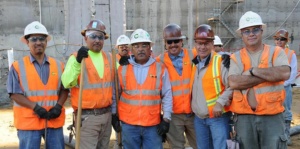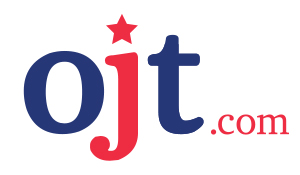
Registered Apprenticeship Programs
LIUNA urges Congress and the administration to ensure that self-funded Labor-Management Registered Apprenticeship programs like LIUNA’s are not undermined as legislators seek to expand apprenticeship. Federal and state governments also should not subsidize experiments in industry-regulated approaches to training at the expense of proven labor-management
programs.
LIUNA and our partner employers have, for decades, met the workforce development needs of the construction industry by building a self-funded training infrastructure and Registered Apprenticeship programs. Employers remain fully involved by contributing monetarily, sitting as active trustees and JATC, and in program development as subject matter experts.
State-of-the-art training is free and accessible to participating contractors, members, apprentices and pre-apprentices across the U.S. and Canada through over 70 affiliated training centers. Continual, life-long career training opportunities allows workers to upgrade employability skills, move to leadership positions, update safety knowledge, and increase productivity all with the goal of expanding career paths, living wages, and contractor competitiveness.
LIUNA’s labor-management training programs invest millions of private-sector dollars annually into this proven workforce development system. Most recent bipartisan efforts to expand apprenticeship programs across new industries have instead followed a model based on federal and state investment and competitive grants.
Registered Apprenticeships are a benefit to employers, workers, and the public but without careful consideration, these efforts carry the risk of undercutting existing programs. Creating a system with little-to-no enforcement and is structured to reduce wages, standards, oversite, and worker protection will not produce more skill apprentices. Worse it puts high-quality, self-funded joint employer and labor programs like LIUNA’s at a disadvantage as they are forced to compete with subsidized programs that are not required to meet the same high standards.
Industry-Recognized Apprenticeship Programs (IRAPs)
The integrity of the Registered Apprenticeship system, under the National Apprenticeship Act, is the responsibility of the U.S. Department of Labor. For many years, DOL has successfully administered the law in the construction sector which accounts for 50% of all Federal Registered Apprenticeships. Recognizing the successful model of construction, the Department issued regulations in 2008 intended to encourage expansion of Registered Apprenticeship.
As the Department of Labor looks for ways to streamline requirements for apprenticeship programs, it must do so responsibly. In 2017, the president issued an Executive Order to create 5 million new apprenticeships over five years. To do so, it proposed a parallel apprenticeship system known as Industry-Recognized Apprenticeship Programs (IRAPs). The order gives the Secretary of Labor wide authority to set standards under this system, and it is currently in formal rulemaking.
The IRAP model, by its very definition, is subject to significantly less than rigorous standards. While Registered Apprenticeship program sponsors must meet high standards to receive recognition from the Department of Labor, IRAPs would be allowed to receive accreditation through private third-party organizations approved by the DOL. IRAPs would not be required to comply with Equal Employment Opportunity regulations and other standards for apprenticeships. With the approval process for accreditors is still vague, this is a cause for concern as these private entities’ capacity and expertise is unknown as well as their potential authority to shape apprenticeship standards.
Protect and Strengthen Health Care

LIUNA members have gone on strike, sacrificed, and bargained for healthcare coverage for themselves and their families. Through negotiated payments from employers and members, members have quality healthcare that transfers with them from employer to employer and jobsite to jobsite.
But for millions of Americans, the healthcare system is severely broken. The Affordable Care Act was a first step for our nation in making health coverage more accessible and affordable for millions of Americans. LIUNA fought and won key improvements to the ACA; including the elimination of onerous taxes, such as the Cadillac tax and other requirements that would have unfairly impacted union member health plans.
LIUNA members support further improvements to our healthcare system, including reducing the age for Medicare eligibility, and other expansions of Medicare. We support efforts to drive down prescription drug costs, stop surprise medical bills, and control healthcare insurance premiums.
Improving our healthcare system must preserve the union healthcare plans working men and women have sacrificed to obtain and must recognize that healthcare is a fundamental human right for all Americans.
Find out more about how multi-employer union healthcare plans work? Learn more.

Training
LIUNA training helps members and contractors work smarter and better.
LIUNA training includes more than 50 different courses, opening the doors to new opportunity and advancement for members and providing contractors with the skills they need. Classes are available in every state in the U.S. and every province in Canada and provide valuable learning in areas such as hazardous materials remediation, remote tunneling, concrete work and an array of building construction skills.
Training helps employers compete with higher productivity and quality, and helps workers earn more and work more safely.

How Can I Become A Member
You’ve decided you want the LIUNA difference. Here’s how to join.
Working men and women get the LIUNA difference in several ways
- If you are a construction worker or a public employee, by joining together with coworkers to form a union with LIUNA.
- In the construction industry, by reaching out to a Local Union where you live or work.
- By working for an employer which already has a contract with LIUNA.

LIUNA Structure
Through the years, LIUNA has grown and prospered, and is now comprised of:
- Over 500,000 members
- 400 Local Unions
- 44 District Councils
- 9 Regional Offices
- 1 Canadian Sub-Regional Office
- International Headquarters in Washington, DC
The International Union and all affiliates operate under LIUNA’s Constitution, which is subject to amendment by delegates attending the International Union General Convention held every five years. The Union’s programs and agenda are set at the same General Convention through the consideration and adoption of resolutions submitted by Convention delegates and by the General Executive Board.
A great deal of the work of LIUNA is carried out through the International Union. Some of the International’s responsibilities are:
- Collective bargaining with national contractors both in construction and in other industries is conducted by the International Union on behalf of all affiliates.
- Representation of all Laborers in the AFL-CIO, the Building and Construction Trades Department, the Heavy Highway Coalition, and throughout the Labor Movement.
- Representation of the membership on Capitol Hill and in Parliament.
- Overseeing and supporting organizing programs carried on at both local and regional levels.
- Working with our Tri-Funds to see that Laborers receive the best in training, the most vigilant protection of members’ health and safety, and the most aggressive pursuit of additional employment opportunities.
There are nine LIUNA Regions with offices and staff including Regional Managers and International Representatives that provide assistance to the District Councils and Local Unions within their regions, and represent the International to each.
LIUNA members are represented on the job by Local Unions. Local Union Business Managers shoulder this responsibility, in many cases with the assistance of one or more field representatives. In addition, Business Managers may appoint stewards to provide day-to-day representation on the job site. Business Managers are elected by union members—as are the other officers of your Local Union Executive Board. Local Unions protect members in many ways, such as:
- Enforces rights under the collective bargaining agreement.
- Assists members in finding employment through its referral service or hiring hall.
- Provides apprenticeship and training programs, offering members the opportunity to develop and improve skills needed to obtain—and to retain—employment in an ever more complex and demanding working environment.
- Enforces legal rights, such as those extended to workers under the National Labor Relations Act.










